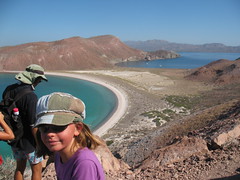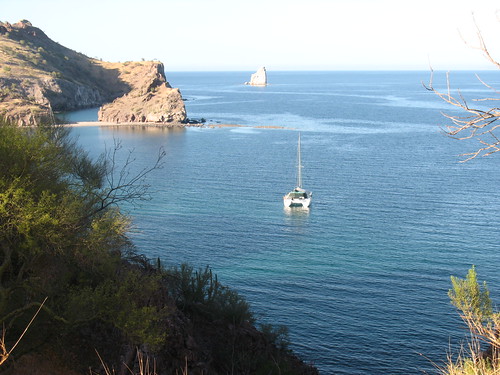Doing More With Less - Money
Everything about doing more with less is about not spending money, resources, or both. Less food, less soap, less water, less electricity, less clothing. Less less less. It's all about money. On the other hand, there are ways to just stop spending money by the simple expedient of Not Spending the Money.
Now, I'm not an expert at this. There are experts. There are probably hundreds of web sites now devoted to helping folks save – or simply stop spending – money. I feel like an amateur in a growing cottage industry. All I have to offer is how the Conger family stops spending money... for which there is only one real tip:
Do not go to town.
For a cruiser, town presents a kaleidescope of pleasures and temptations, each of which is associated with a price tag. There is the marina – a safe haven of showers, clean laundry, endless water, and constant Internet access. There are grocery stores, chandlers, and hardware stores. There are fabric stores, clothing stores, electronic stores, and the granddaddy of all consumptive rat holes: WalMart. You can find taquerias, taco stands, and restaurants, panaderias, coffee shops, and bars. How about dinner out with friends? Or an evening listening to music at the local bar?
But pull the hook, drop the lines, motor sail out of the harbor and down the coastline ten miles, and all opportunities to spend money disappear. There may be a palapa from which you can purchase a beer or limonada... and then again, maybe there won't. Make your own water, cook all your own meals, sail from place to place, entertain yourselves and each other. There is literally no place to spend money.
In fact, I have tracked our expenditures for over a year now, and the data supports this conclusion. The total monthly spending for Don Quixote increases in direct proportion to the number of days we spend near a town. The longer we spend bobbing around in the middle of nowhere, the less we spend. And this isn't just a delayed gratification effect. You can see some of that in the data as we either provision before going out or fix things on our return. However, putting aside equipment purchases for boat repair, you still see a very strong correlation between increased expenses and town life.
When we go to town, we spend money. When we don't go to town, we don't.
That seems absurdly simplistic, but I wonder at times if we can use this as a metaphor for life. Even in the city – living in a house in the suburbs – we could pretend we are at anchor. Pretend like you can't run to the store for deli dinner, swing by the coffee shop on the way to work, or call for pizza. Imagine a house fifteen miles from the nearest civilization and no car to get there. What can you eat? How can you entertain yourself? Do you really need retail therapy in the form of new shoes or clothes or electronics or furniture or a night at the multiplex? If you couldn't connect to the Internet to buy something, would you buy it today? After thinking about the purchase for a week, would you still buy it or decide you could do without?
Personally, I plan to make a commitment on our return to civilization to declare “anchor out weeks” for the family. During those weeks, we absolutely won't buy anything. We'll provision and fuel up in advance, we'll make lists of what we need to buy when we “get back.” During those weeks, we will empty our wallets of cash and leave the credit cards at home. No doubt, anchoring out within walking distance of our favorite cafes is going to be more challenging with pitfalls, perils and temptations galore. On the other hand, we know we can do it, we've done it many times before, and it turns out that each and every time we've had to go for a few weeks without, we've survived. Perhaps more importantly, our checking account has done more than survived... it's thrived.
Now, I'm not an expert at this. There are experts. There are probably hundreds of web sites now devoted to helping folks save – or simply stop spending – money. I feel like an amateur in a growing cottage industry. All I have to offer is how the Conger family stops spending money... for which there is only one real tip:
Do not go to town.
For a cruiser, town presents a kaleidescope of pleasures and temptations, each of which is associated with a price tag. There is the marina – a safe haven of showers, clean laundry, endless water, and constant Internet access. There are grocery stores, chandlers, and hardware stores. There are fabric stores, clothing stores, electronic stores, and the granddaddy of all consumptive rat holes: WalMart. You can find taquerias, taco stands, and restaurants, panaderias, coffee shops, and bars. How about dinner out with friends? Or an evening listening to music at the local bar?
But pull the hook, drop the lines, motor sail out of the harbor and down the coastline ten miles, and all opportunities to spend money disappear. There may be a palapa from which you can purchase a beer or limonada... and then again, maybe there won't. Make your own water, cook all your own meals, sail from place to place, entertain yourselves and each other. There is literally no place to spend money.
In fact, I have tracked our expenditures for over a year now, and the data supports this conclusion. The total monthly spending for Don Quixote increases in direct proportion to the number of days we spend near a town. The longer we spend bobbing around in the middle of nowhere, the less we spend. And this isn't just a delayed gratification effect. You can see some of that in the data as we either provision before going out or fix things on our return. However, putting aside equipment purchases for boat repair, you still see a very strong correlation between increased expenses and town life.
When we go to town, we spend money. When we don't go to town, we don't.
That seems absurdly simplistic, but I wonder at times if we can use this as a metaphor for life. Even in the city – living in a house in the suburbs – we could pretend we are at anchor. Pretend like you can't run to the store for deli dinner, swing by the coffee shop on the way to work, or call for pizza. Imagine a house fifteen miles from the nearest civilization and no car to get there. What can you eat? How can you entertain yourself? Do you really need retail therapy in the form of new shoes or clothes or electronics or furniture or a night at the multiplex? If you couldn't connect to the Internet to buy something, would you buy it today? After thinking about the purchase for a week, would you still buy it or decide you could do without?
Personally, I plan to make a commitment on our return to civilization to declare “anchor out weeks” for the family. During those weeks, we absolutely won't buy anything. We'll provision and fuel up in advance, we'll make lists of what we need to buy when we “get back.” During those weeks, we will empty our wallets of cash and leave the credit cards at home. No doubt, anchoring out within walking distance of our favorite cafes is going to be more challenging with pitfalls, perils and temptations galore. On the other hand, we know we can do it, we've done it many times before, and it turns out that each and every time we've had to go for a few weeks without, we've survived. Perhaps more importantly, our checking account has done more than survived... it's thrived.

